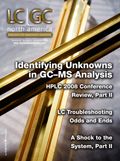Torion Technologies, Inc. Partners with Smiths Detection
Torion Technologies, Inc. (American Fork, Utah), a manufacturer of automated miniaturized, hand-portable GC and toroidal ion trap mass spectrometry (TMS) technology, has announced a partnership with Smiths Detection (Danbury,Connecticut), part of the global technology business, Smiths Group, and a technology developer and manufacturer of sensors that detect and identify explosives, chemical and biological agents, weapons, and contraband.
Torion Technologies, Inc. (American Fork, Utah), a manufacturer of automated miniaturized, hand-portable GC and toroidal ion trap mass spectrometry (TMS) technology, has announced a partnership with Smiths Detection (Danbury,Connecticut), part of the global technology business, Smiths Group, and a technology developer and manufacturer of sensors that detect and identify explosives, chemical and biological agents, weapons, and contraband.
According to the companies, the alliance enables the joint development of a next-generation, hand-portable GC–TMS system for the security, defense, and civil emergency responder markets. This technology is designed to identify a variety of substances such as chemical warfare agents (CWAs) and simulants, volatile and semivolatile organic compounds (VOCs and SVs), and other hazardous compounds.

SPE-Based Method for Detecting Harmful Textile Residues
January 14th 2025University of Valencia scientists recently developed a method using solid-phase extraction (SPE) followed by high-performance liquid chromatography coupled to high-resolution mass spectrometry (HPLC–HRMS/MS) for detecting microplastics and other harmful substances in textiles.
The Complexity of Oligonucleotide Separations
January 9th 2025Peter Pellegrinelli, Applications Specialist at Advanced Materials Technology (AMT) explains the complexity of oligonucleotide separations due to the unique chemical properties of these molecules. Issues such as varying length, sequence complexity, and hydrophilic-hydrophobic characteristics make efficient separations difficult. Separation scientists are addressing these challenges by modifying mobile phase compositions, using varying ion-pairing reagents, and exploring alternative separation modes like HILIC and ion-exchange chromatography. Due to these complexities, AMT has introduced the HALO® OLIGO column, which offers high-resolution, fast separations through its innovative Fused-Core® technology and high pH stability. Alongside explaining the new column, Peter looks to the future of these separations and what is next to come.